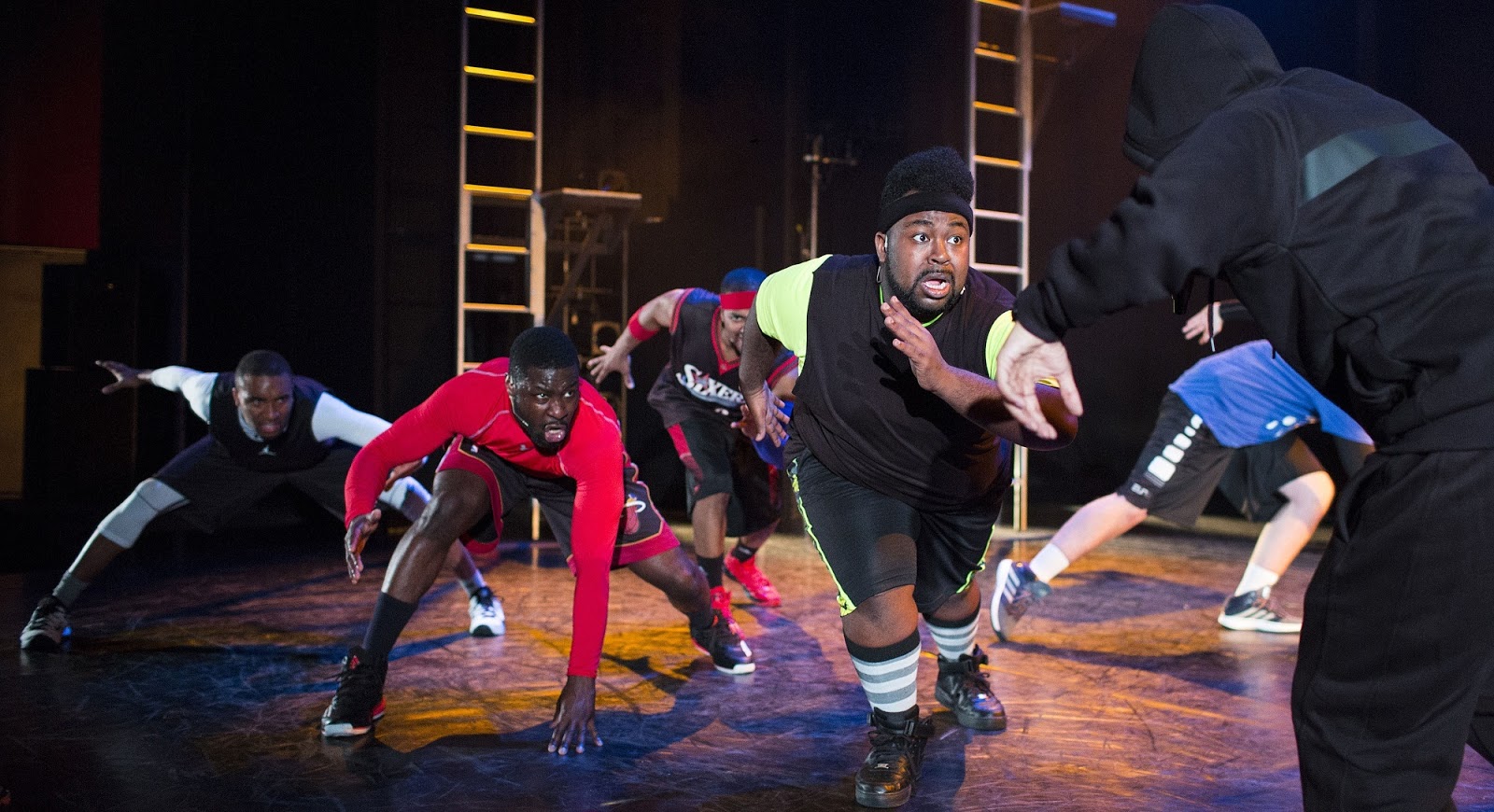A theatre show about boys playing basketball: I’m not drawn to the subject, but I like previous work by performance poet and writer Inua Ellams and physical theatre director Benji Reid (who haven’t to my knowledge previously collaborated), and I’m interested to see what they’ll do together. I leave the theatre on a high, delighted to have been invited into this world, enriched by the eloquent stories told and the vibrant sounds and images created. We are asked to consider why ‘…those who kick / are always championed over those who catch, those / who row over those who throw, those who bat / over those who bounce past.’ By the time we leave, we’re all fans of the sport that is shown to be such a life-saver for so many lost boys, summed up beautifully in one of the poems that comes early in the play: ‘This is a about a boy who wished to be a man. / This is about a man who wished to be a king. / This is about a king who wished to be a god. / This is about a god who found his humanity.’ (Poems used in The Spalding Suite are by Inua Ellams, Jacob Sam-La Rose, and Nii Ayikwei Parkes.)
The show gives us five actor-dancers, each portraying a member of a team of guys who play ball together, as well as providing an ensemble of physical action that supports the stories told through verse – yes, just like Shakespeare! There’s also beatboxer MC Zani, who stands by the side of the stage with his laptop and mic providing an elegant and fresh live-mixed soundscape that integrates his live sound with pre-recorded music/sound by producer Eric Lau. Sometimes Zani enters the stage action. With his black hoodie pulled down to cover his face, he’s a kind of ‘spirit of the game’ presence – there but not there, weaving through the players but staying apart.
The staging is simple but effective, a strong scenographic statement: tall silver ladders to each side, providing a space for players off-stage to become gods of the game, observing the action below; and a big square frame on the back wall, which in one beautiful image provides the setting for a fresco of human figures ‘pinned’ to the wall. A series of different-sized wooden frames, brought on for various scenes, are less effective as their manipulation seems to dominate the stage action, taking too much attention away from the performers. A harness that allows the character at the heart of the story to twist and spin above the ground works well as a symbolic tool for the ‘finding your wings and flying’ central metaphor of the play.
There are no basketball nets, which is a great dramaturgical decision. The focus stays on the words, and the fluid physical dance of the performers, who sometimes have real balls and sometimes weave amazing patterns with imaginary balls (the bounces, boings and creaks of the game sounded by MC Zani).
The five characters win our hearts. Some right from the start: Jay (played by Emmanuel Akwafo) is the clown of the team; the chubby boy who is delighted to get a look-in with the ball, and cheerfully puts up with the wrath of his colleagues when he misses a pass. His rendition of a poem about his mum in a scene called The Summit of Flight is both heartwarming and heartbreaking: ‘Mother means well but I wring the neck / of my water bottle when she yells / Even rugby is better than throwing / a large onion into a basket like a girl / in a market, it’s a game for girls.’ Others, like Yawo (Jason York) are rather more prickly – his troubled past, and mental health issues that manifest as anger, make him less likeable than some other characters, but by the end of the play we’ve seen him rise above his difficult past, finding salvation in the game and with the ‘band of brothers’ who play it.
The other cast members are KM Drew Boateng as natural team leader Archie, Marcquelle Ward as vain but lovable Matt, and George Bray as the ernest outsider, Tom. All six performers are excellent, bringing a range of skills from very different professional backgrounds that include theatre, street dance, beatboxing, musical theatre, sport, and TV. We learn in the post-show discussion that some of them met playing basketball, whilst others had never thrown a ball in their life before auditioning for the show. (Spalding, for the record, is a famous brand of basketball.) The ensemble make a great team – truly a band of brothers.
The Spalding Suite is a great success, being both populist and intelligent. And it’s fantastic to see a packed house with such a diverse audience: basketball and beatboxing fans, performance poetry enthusiasts, and regular Brighton Festival-goer dance and theatre aficionados all equally happy with what’s being presented, giving the cast a well-deserved standing ovation at the end of the show. For just a short time we too had wings and were free to fly.

